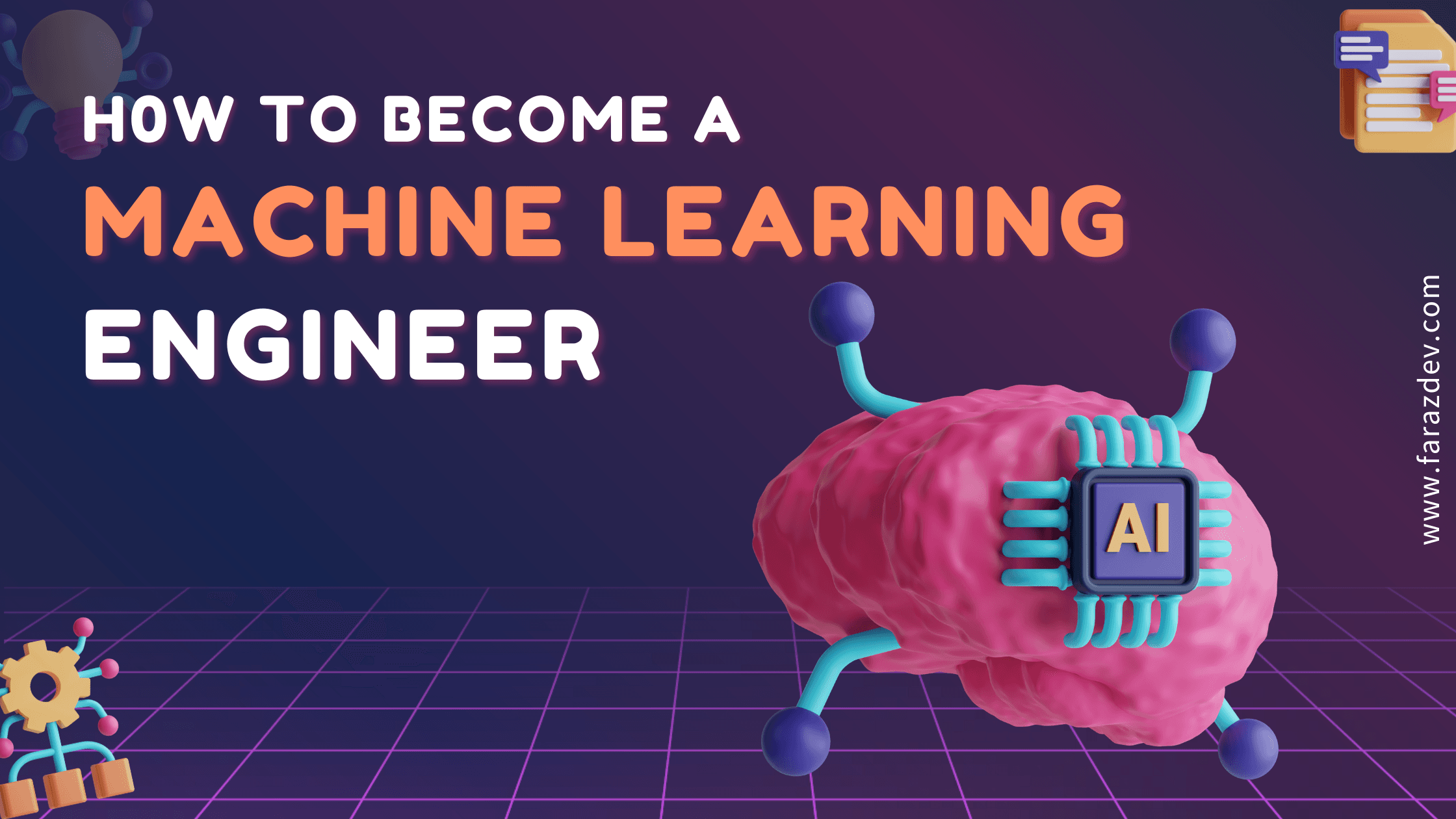Are you a software engineer or Data scientist and want to become a machine learning engineer? If that’s the case, this article is for you.
We all are acquainted with Facebook ads, Netflix, entertainment websites, and browsing different things. These are also built up by machine learning and artificial intelligence. With this, consumers can have more intuitive and appropriate suggestions.
Moreover, becoming a machine learning engineer requires much effort and knowledge. As a machine learning engineer, you must leverage your software engineering and data science expertise to create intelligent systems that can predict and make decisions without explicit programming.
In this, we’ll give you a brief guideline on a machine learning career and how you can become a Machine Learning Engineer without a degree.
What is a Machine Learning Engineer?
A Machine Learning Engineer is a computer program that designs and builds models that learn from given data. Furthermore, the expertise of a machine learning engineer combines software engineering, computer science, and data science knowledge, from which they develop machine learning models that can automate predictive models.
Moreover, a machine learning engineer’s main and ideal goal is to solve real-world problems by applying intelligence techniques and algorithms. Industries are getting revolutionized and relying on big data and automation. According to Zippia, 97% of organizations and businesses invest in artificial intelligence and big data.
What does an ML Engineer do?
A machine learning engineer holds the responsibility for all machine learning management- from designing and developing to implementation. Their work requires a combination of data science, software engineering, statistical, computer programming skills, and a solid understanding of machine learning libraries e.g. TensorFlow, sci-kit-learn, or PyTorch, like the back of their hand.
Data Building and Feature Matrix
Data is organized and upcycled by machine learning engineers for the model. The data is molded for the model purposes and each loophole, futile data structure, and incorrect format is corrected. Missing features and upgrading the included features are formulated through machine learning algorithms, Python, principal component analysis(PCA), numerical analysis, label encoding, kernel methods, etc.
Training and Evaluation
Machine learning engineer uses data modeling to present the acquired data and figure out the parts of the model which needs to be trained. It includes algorithm learning and hyperparameters combination search through grid search or Bayesian optimization. After optimization, the model is evaluated through multiple metrics, e.g., F1 score, recalling, and precision. Different methods are taken in hand for this evaluation cross-validation and SHAP values to understand each feature and its performance.
Deployment:
After analyzing the functioning models, The ML engineers then accommodate the model for existing projects, web services, software development, etc. Afterward, new predictions, decisions, and expected results are achieved. A/B testing is also used between multiple models before deployment to select the best model.
Monitoring
Machine learning engineers stay vigilant towards the model working after deployment by collecting user feedback. They analyze the metrics, e.g., accurate results and speed, through unwavering connection with the operational team and make updates accordingly.
Steps to Become a Machine Learning Engineer
1- Learn Coding
Coding is the initial stage of any computing programming field. If you want to pursue a machine learning engineer career, you must have strong coding skills to code different Artificial intelligence models.
Coding is vital for a ML engineer to learn to code, as they have to integrate different machine learning models with APIs and web services. Coding also helps machine learning engineers in troubleshooting and debugging in model development.
Here are a few common languages which are important to learn for Machine learning engineers:
Python
Python is one of the most common and famous programming languages. The language is versatile and simple to understand. It has robust frameworks and libraries, making it extremely popular for machine learning engineering.
So, it is vital for you to start your journey by learning Python and how to code with it. Python is an easy-to-understand language that integrates with other languages, such as C++. The versatility and flexibility of this language make it unique and a great choice for newbie learners.
MATLAB
MATLAB is another popular programming language for machine learning. It comes with many features and tools suitable for machine learning engineering. Although this language isn’t superior to Python, but learning it will make your skills much better.
Java
Java is not famous as Python or R, but it certainly plays a role in machine learning. It also has many libraries that help with many machine-learning tasks and models. Moreover, it is an independent language, giving all developers security and flexibility.
Read more: Top 5 Programming Languages to Learn for Artificial Intelligence.
2- Enroll in Machine Learning Course
It is one of the best ways to learn machine learning and its core concepts. Many websites, such as Udemy and Coursera, offer machine learning courses, which will be useful for your engineering journey.
Furthermore, you can join bootcamps and programs if you are more interested. It will teach concepts about machine learning and help you scale your skills to an advanced level. Courses, programs, and bootcamps are crucial for your deep learning.
It will also help you succeed in getting jobs and internships. In addition, you can also follow professionals in this field and ask for guidance.
3- Practice Machine Learning and Develop a Portfolio
It is indispensable for you to practice what you have learned in the courses. Otherwise, it will all go in vain. In the initial stage, you can start by recreating different projects offered by several resources such as Scikit-learn. There are also coding platforms where you can practice and create programs. Some of the websites are Kaggle, CodeChef, Codewars, etc.
Please keep in mind that don’t go for advanced projects, try to practice on simple AI projects, which can also boost your confidence and advance your skills. Furthermore, Github is another popular website to learn from. Many programmers, data scientists, and software developers leverage Github for their projects.
So, in a nutshell, start with your own projects to learn and understand better. It will help you understand the nitty-gritty details of your future projects. In addition, you can use GitHub or create your blog for your portfolio. You can mention previous projects, skillsets, soft skills, and contact info in your portfolio.
4- Join Bootcamps and Online Machine Learning Courses
There is no need to fret in this digital era for achieving anything without a degree. You won’t believe but an online course can provide more knowledge than formal education. Data Science Bootcamp and Online platforms such as Coursera, Udemy, edX, and Codecademy are reliable enough to gain command of Python, data structures, linear algebra, programming languages, machine learning algorithms, computer science, and technical skills. You will be awarded specialization certificates on each course, which will make your portfolio notable before the clients.
5- Specialized Skills and Subdisciplines
As a machine learning engineer, you must acquire technical and specialized skills to build a solid foundation. Here are the skills that are vital to specialize:
Learn Core Concepts of Mathematics and Statistics
Machine learning algorithms require a deep understanding of mathematics and statistics, so you must learn the basics and build a solid understanding of mathematics, including calculus, algebra, and probability.
Mastery of Programming Languages
To become a machine learning engineer, you should master the art of programming languages. With this, you can write efficient codes for machine learning models. We have mentioned the names of common programming languages above.
Machine Learning Frameworks and Libraries
It is also a key to learning machine learning frameworks and libraries. These tools help to practice and apply machine learning systems. Here are the names of some of the popular tools and frameworks for machine learning:
TensorFlow
TensorFlow is one of the famous machine learning tools where you can perform machine learning tasks. It is the invention of Google Brain. TensorFlow combines ML and deep learning models to train with the help of large datasets, so they can think and produce sensible outcomes.
Keras
Keras is a no-brainer model introduced by Google engineer Francois Choilet. It has Python coding and became the ideal pick for developing advanced machine learning algorithms and operating CPU and GPU like a clockwork. It has a defined API that makes it fast-working and suitable for multi-backend systems like e-commerce etc.
Caffe
Convolutional Architecture for Fast Feature Embedding (Caffe) is an open-source, cutting-edge model suitable for analyzing images and evaluating new research frameworks. This model is used for Artificial intelligence projects involving computer vision, auditory and visual coding, facial and speech recognition. Caffe is developed in C+++ language, enabling machine learning engineers to change data mode inside the CPU and GPU.
6- Join Online Machine Learning Communities
Machine learning communities introduce you to the same field heads who bring their insights and experiences. You can leverage these communities for deep learning, present your queries, collaboration requests, and resources, and maintain connections further to find job opportunities. Some examples of these communities are Reddit’s r/machinelearning, Kaggle, and GitHub. You can also join machine learning competitions to learn and master core concepts.
7- Stay Updated
To avoid staying behind in an ever-evolving- era, it’s better to upskill, persist learning process, and grab an understanding of every new invention. It’s essential to keep your finger on the pulse of trending news, stay toe to toe with influentials experts, take online courses on closely related fields, and self-study from online resources such as blog posts, webinars, workshops, Twitter, LinkedIn, and Instagram
How to get a Machine Learning Engineers Job
Getting a machine learning engineer job is not a piece of cake, especially when you are just starting to evolve. If you have machine learning skills and a computer science degree, getting a job will be easier. Here are some of the ways which can help you in getting a machine learning job:
Apply to Machine Learning Internships
There are many online opportunities offering internships for beginners offered by different companies and organizations. You can apply for those internships and upscaling your skills. Moreover, you will also get to meet experts who can refer you further and increase your chances of getting a well-paid job.
Join LinkedIn
LinkedIn is among the best platforms to hunt jobs and connect with professionals like hiring managers. Almost 72% of recruiters hire professionals through LinkedIn. You can easily search for machine learning jobs on LinkedIn by applying different filters. This platform also allows you to build your network. It suggests different professionals from your field in your feed, so you can easily connect with them.
Start Freelancing
Freelancing is another way to build your machine learning career. You can work on different projects remotely and add them to your portfolio, increasing your chances of getting a job. You can also ask your clients to refer you to companies. Upwork, Fiverr, and Freelancer.com are some of the biggest freelance platforms you can consider joining.
Market yourself on Social Media
At last, you can create your brand on social media accounts and promote your services to different people. It will make you visible to different people and increase your chances of connecting to companies and agencies.
How Long Does it Take to Become a Machine Learning Engineer?
There is no exact time to become a Machine Learning engineer. It all depends on your dedication, perseverance, skills, and knowledge. It can take up to 6 months to 2 years to master every skill, depending upon your abilities. Start improving your skills by practicing on your own machine-learning projects, which is a good way to test your skills.
Conclusion
Becoming a machine learning engineer without a degree is possible if you have computer science and data science skills. You can join online courses related to machine learning to learn more about the concepts and algorithms. We have mentioned the steps and tips in our above article.
If you want to read more about making money, freelancing, and artificial intelligence, visit Farazdev.com!




